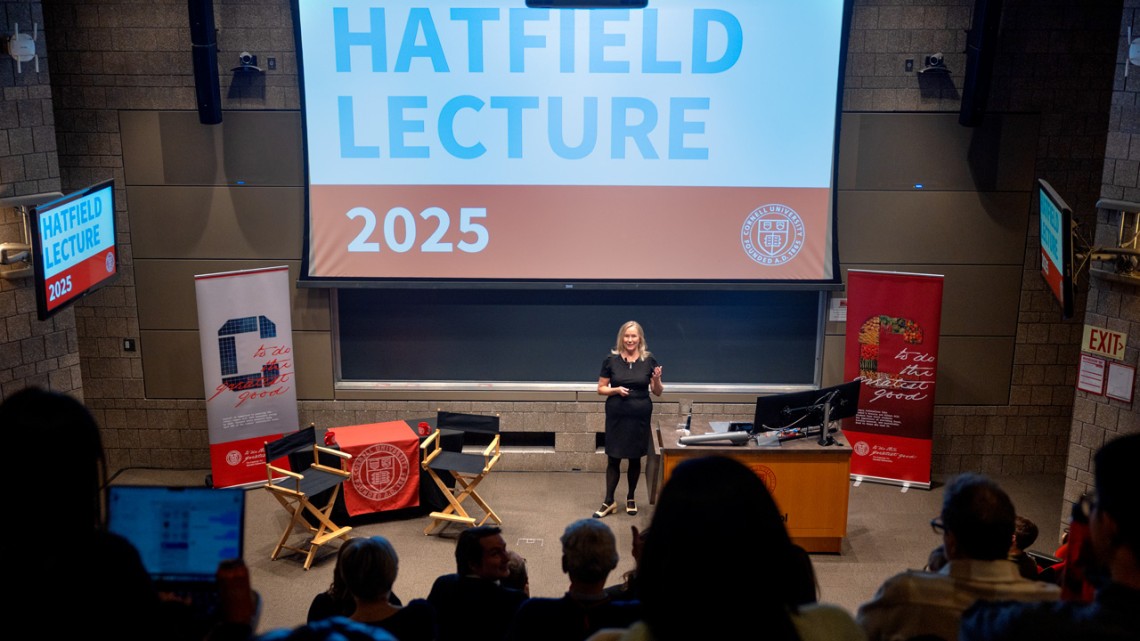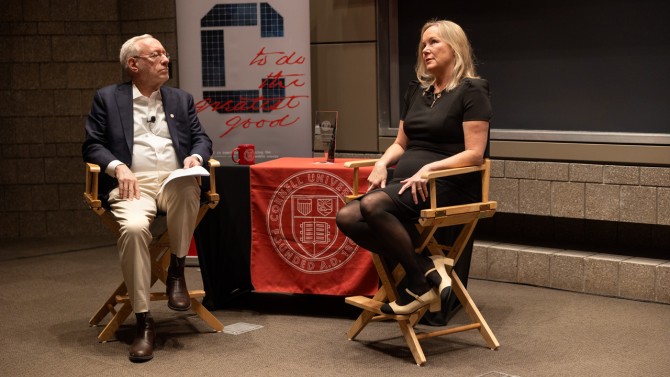
Christy Pambianchi ’90, executive vice president and chief people officer at Intel, delivers the Hatfield Lecture in Ives Hall.
Hatfield lecturer offers insights on obtaining success
By Julie Greco
“Do we work to live or live to work?”
Christy Pambianchi ’90, Cornell’s 42nd Robert S. Hatfield Fellow in Economic Education, asked that question of the nearly 300 alumni, students and Cornell community members gathered on April 10 in 105 Ives Hall and online.
“You think you may know the answer to that,” she said, “but maybe after I give you these things to think about, you’ll see that these two things aren’t that extricable.”
In a conversation with Cornell President Michael I. Kotlikoff, Pambianchi reflected on her more than 30 years of experience as a human resources officer at some of the world’s most well-known companies, including PepsiCo, Corning Inc., Verizon and Intel, where she has worked since August 2021. She will leave Intel at the end of this month to join heavy equipment manufacturer Caterpillar as its chief human resources officer.
Pambianchi, the ILR School’s Groat Award winner in 2023, said Americans spend most of their time at work. And as life expectancy increases, she said, many individuals will work 50 or more years – so they have time to “pivot” if they don’t love what they’re doing. With that in mind, she said, organizations must see that employees have different needs.
Pambianchi urged the students in the audience to think about their careers as Mount Everest. “You think, ‘How do I get to base camp 1?’” she said. “‘OK, now that I’m at base camp 1, do I still want to go higher, or do I want to go and climb a different mountain?’”
A rapidly changing world of work, she said, provides challenges and opportunities for employees and employers.
“The speed of innovation is exciting, and it’s thrilling to speak about this at Cornell,” Pambianchi said. “Every element of the innovations in the world are touched by research or advancements made at Cornell.”
Constant innovation means that workers need to be agile and flexible, and must continually expand their skills, Pambianchi said. Organizations need to prepare for disruption, knowing that those who don’t adapt go out of business. For society at large, she said, countries must ensure that they have relevant jobs in their economies so that their people have work.
Another trend Pambianchi sees is the need for individuals to grow and invest in their skills, noting that more highly educated people tend to live longer. “We’re going to live to 100 and work for 50 years,” she said, “so we can’t live in a world where we stop learning at 18.”
Organizations will need to invest in training their workers, she said, while the larger society needs to help its citizens develop the skills that correlate to job readiness.
Pambianchi said 70% of people define their purpose through work, and that those who do are more resilient, report better health, are more likely to stay at their jobs and are more likely to go above and beyond to make their company successful.
“So find a way to affiliate with something you love,” Pambianchi said.
Organizations, she said, need to define a clear strategy and purpose, and think about how those things will resonate with the talent they want to attract to their business.
Pambianchi concluded by saying that societies must also think about the policies being put in place that will allow investment in strong pathways from education to work in their communities.
“What I got from the ILR School was this deep, deep appreciation for the fact that work does shape someone’s whole life,” she said, “and that what job you have is the driver of what you make, where your family can live, what access your family has to education or health care. It is the juggernaut to the quality of the life that you have.”
Julie Greco is a senior communications specialist for the ILR School.
Media Contact
Get Cornell news delivered right to your inbox.
Subscribe

